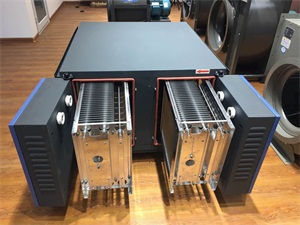1、局部排风部位及要求
1. Local exhaust parts and requirements
中餐厨房:其烹调的发热量和排烟量一般较大,排风量也较大,排气罩一般选用抽油烟罩。为减轻油烟对环境的影响,可选用消洗烟罩。
Chinese food kitchen: the heating capacity and smoke exhaust capacity of cooking are generally large, and the exhaust air volume is also large. The exhaust hood is generally oil fume hood. In order to reduce the impact of oil fume on the environment, the purge hood can be selected.
蒸煮间:此间对新风的要求较低,但排风效果一定要好,否则,蒸汽将充满整个工作间,影响厨师工作,排气排出的主要是水蒸气,可以不采用和净化装置,直接排出。
Cooking room: the requirements for fresh air are low here, but the exhaust effect must be good. Otherwise, the steam will fill the whole workshop and affect the work of chefs. The exhaust is mainly steam, which can be directly discharged without and purification devices.
通风管道
Ventilation duct
西餐厨房:烹调量并不很大,但要求设备多而全,排风量要小于中餐厨房。
Western food kitchen: the cooking capacity is not very large, but the equipment is required to be more and complete, and the exhaust air volume should be less than that of Chinese food kitchen.
洗碗间:需要较大的排风量。
Dishwashing room: large exhaust air volume is required.
2、厨房补风的要求
2. Requirements for kitchen air supplement
对于设置集中空调系统的建筑来说,厨房的工作环境能够保证,其补风多为有序送风,灵活性也较大,在目前厨房的通风系统中,多为以下三种补风方式:
For buildings equipped with central air conditioning system, the working environment of the kitchen can ensure that the air supplement is mostly orderly air supply and flexible. In the current kitchen ventilation system, there are mainly the following three air supplement methods:

(1)餐厅空调为全新风直流式空调系统,空调新风送入餐厅,然后流入厨房经排风系统排出室外。此种方式投资较少,餐厅内采暖通风效果好。不足之处是大量空调风会被直接排出,新风能耗大,不利于。
(1) The restaurant air conditioner is a fresh air DC air conditioning system. The fresh air of the air conditioner is first sent to the restaurant, then flows into the kitchen and is discharged outdoors through the exhaust system. This method has less investment and good heating and ventilation effect in the restaurant. The disadvantage is that a large amount of air conditioning air will be discharged directly, and the energy consumption of fresh air is large, which is not conducive to energy saving.
(2)将组合式空调机组的新风一部分直接补入厨房,一部分送入餐厅,并通过回风机回到空调机。这样可以部分解决新风能耗大的问题,同时使用的灵活性也较大。可在厨房设置测压装置,当厨房排风机全部工作时,负压增大,则回风电动阀关闭,回风机停,餐厅送风大量补入厨房;当少部分排风机开启或排风机不工作时,负压不是很大,则回风电动阀打开,回风机启动,避免空调送风全部被排出。
(2) Part of the fresh air of the combined air conditioning unit is directly fed into the kitchen, part is sent to the restaurant, and returns to the air conditioner through the return fan. In this way, the problem of large energy consumption of fresh air can be partially solved, and the flexibility of use is also large. A pressure measuring device can be set in the kitchen. When the kitchen exhaust fan is fully working and the negative pressure increases, the return air electric valve will be closed, the return fan will stop, and a large amount of restaurant air supply will be added to the kitchen; When a small number of exhaust fans are turned on or the exhaust fan does not work, and the negative pressure is not very large, the return air electric valve is opened and the return fan is started to avoid all the air supply of the air conditioner being discharged.
(3)用两台机组分别为餐厅、厨房服务,其中厨房为全新风直流系统,直接补充厨房炉灶的排风,而餐厅为一次回风全新空气系统,这个方案能保证餐厅和厨房的空调效果,而且厨房和餐厅系统互不干扰,缺点是初投资较大。
(3) Two units are used to serve the restaurant and kitchen respectively. The kitchen is a new air DC system to directly supplement the exhaust of the kitchen stove, while the restaurant is a new primary return air system. This scheme can ensure the air conditioning effect of the restaurant and kitchen, and the kitchen and restaurant systems do not interfere with each other. The disadvantage is that the initial investment is large.
上一篇:山东通风管道加工根据类型得到面积
下一篇:商用厨房排烟管道安装要注意什么?


